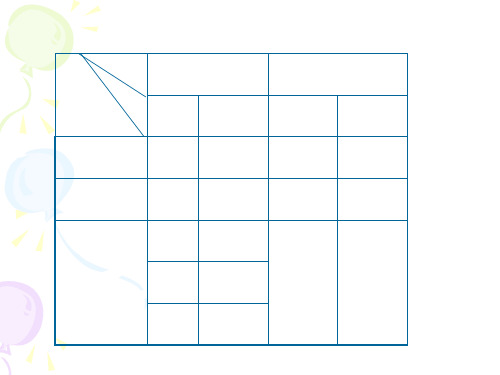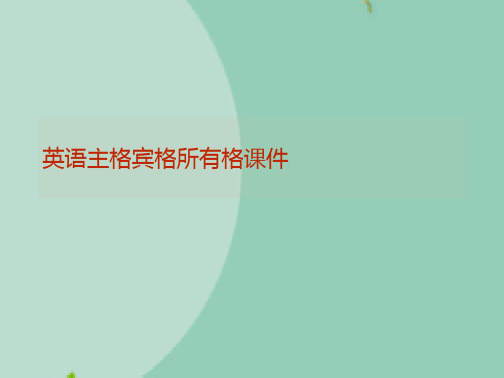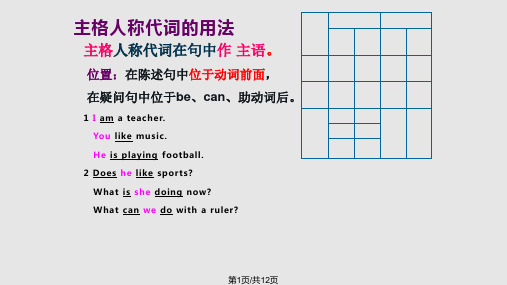英语中的《主格宾格所有格 讲解与练习》课件
合集下载
小学代词讲解-人称代词主格和宾格ppt课件

为了规范事业单位聘用关系,建立和 完善适 应社会 主义市 场经济 体制的 事业单 位工作 人员聘 用制度 ,保障 用人单 位和职 工的合 法权益
物主代词
形容词性 名词性
物主代词
表示“我的”、“你的”、
物主代词: “他的”、“她的”、“它
的”、“我们的”、“你们 的”、“他们的”等的词。
形容词性物主代词和名词性物 为了规范事业单位聘用关系,建立和完善适应社会主义市场经济体制的事业单位工作人员聘用制度,保障用人单位和职工的合法权益 主代词
beautiful dress. (she/her/She/Her)
为了规范事业单位聘用关系,建立和 完善适 应社会 主义市 场经济 体制的 事业单 位工作 人员聘 用制度 ,保障 用人单 位和职 工的合 法权益
人称代词主格和宾格的区别:
人称代词主格在句中作主语,位于动词前。
人称代词宾格在句中作宾语,位于动词后 (介词后)。
为了规范事业单位聘用关系,建立和 完善适 应社会 主义市 场经济 体制的 事业单 位工作 人员聘 用制度 ,保障 用人单 位和职 工的合 法权益
• 名词性物主代词可用在of 后面做定语,相 当于“ of +名词所有格” ,表示带有部 分概念或有一定的感情色彩。
• e g: He is a friend of mine. I am a friend of his .
为了规范事业单位聘用关系,建立和 完善适 应社会 主义市 场经济 体制的 事业单 位工作 人员聘 用制度 ,保障 用人单 位和职 工的合 法权益
代词的种类
主格
人称代词
宾格
代
词 形容词性
物主代词
名词性
为了规范事业单位聘用关系,建立和 完善适 应社会 主义市 场经济 体制的 事业单 位工作 人员聘 用制度 ,保障 用人单 位和职 工的合 法权益
英语主格宾格所有格分类列表PPT课件

's所有格用在人名或者职业后面可以表示处 所 I will go to my uncle's. 我要去我叔叔家。 He is in the doctor's. 他在诊所。
9
双重所有格
of+'s 所有格
He is a friend of Tom's. 他是汤姆的一个朋友。 The man is a brother of my father's. 这个男人是我爸爸的一个兄弟。
4. The apples are on the desk.__________ are very nice.( ) A. They B. Them C. Their D. Theirs
11
6. A friend of will come this evening.
A. Denny's B. Denny C. Dennys'
D. two hours
10. Look at the map. It's .
A. a map of American B. a map of America
C. an American map D. a map to America
12
谢谢聆听
人称代词 第一人称 第二人称
第三人称
数 单数 复数 单数 复数
单数
复数
宾格 me us
you you him her
it them
2) 人称代词有主格和宾格之分。通常主格作主语,宾格作宾语。如: I like table tennis. (作主语) Do you know him?(作宾语)
人称代词有主格和宾格之分。通常主格作主语,宾格作宾语。 如: I like table tennis. (作主语)
9
双重所有格
of+'s 所有格
He is a friend of Tom's. 他是汤姆的一个朋友。 The man is a brother of my father's. 这个男人是我爸爸的一个兄弟。
4. The apples are on the desk.__________ are very nice.( ) A. They B. Them C. Their D. Theirs
11
6. A friend of will come this evening.
A. Denny's B. Denny C. Dennys'
D. two hours
10. Look at the map. It's .
A. a map of American B. a map of America
C. an American map D. a map to America
12
谢谢聆听
人称代词 第一人称 第二人称
第三人称
数 单数 复数 单数 复数
单数
复数
宾格 me us
you you him her
it them
2) 人称代词有主格和宾格之分。通常主格作主语,宾格作宾语。如: I like table tennis. (作主语) Do you know him?(作宾语)
人称代词有主格和宾格之分。通常主格作主语,宾格作宾语。 如: I like table tennis. (作主语)
小学英语人称代词主格和宾格的用法 ppt课件

主格人称代词的用法
主格人称代词在句中作 主语。
位置:在陈述句中位于动词前面, 在疑问句中位于be、can、助动词后。
1 I am a teacher. You like music. He is playing football.
2 Does he like sports? What is she doing now? What can we do with a ruler?
名词性物主代词相当于名词,在句中作主语或宾语。
1 This is my book. The book is mine. mine = பைடு நூலகம்y book
2 That is her bike. The bike is hers. hers = her bike
pollyitsname物主代词物主代词第一人称第二人称第三人称第一人称第二人第三人称mymine物主代词物主代词第一人称第二人称第三人称第一人称第二人第三人称我们的你们的他们的myyourhisheritsouryourmineyourshishersitsoursyourstheirs10形容词性形容词性物主代词和物主代词和名词性名词性物主物主代词的用法代词的用法mybook
精品资料
• 你怎么称呼老师?
• 如果老师最后没有总结一节课的重点的难点,你 是否会认为老师的教学方法需要改进?
• 你所经历的课堂,是讲座式还是讨论式? • 教师的教鞭
• “不怕太阳晒,也不怕那风雨狂,只怕先生骂我 笨,没有学问无颜见爹娘 ……”
• “太阳当空照,花儿对我笑,小鸟说早早早……”
宾格人称代词的用法
选择正确的代词填空
1 Are those books for t_h_e_m_ ? (they/them) 2 Mike is Mary’s deskmate. _H_e__ (He/Him)
主格人称代词在句中作 主语。
位置:在陈述句中位于动词前面, 在疑问句中位于be、can、助动词后。
1 I am a teacher. You like music. He is playing football.
2 Does he like sports? What is she doing now? What can we do with a ruler?
名词性物主代词相当于名词,在句中作主语或宾语。
1 This is my book. The book is mine. mine = பைடு நூலகம்y book
2 That is her bike. The bike is hers. hers = her bike
pollyitsname物主代词物主代词第一人称第二人称第三人称第一人称第二人第三人称mymine物主代词物主代词第一人称第二人称第三人称第一人称第二人第三人称我们的你们的他们的myyourhisheritsouryourmineyourshishersitsoursyourstheirs10形容词性形容词性物主代词和物主代词和名词性名词性物主物主代词的用法代词的用法mybook
精品资料
• 你怎么称呼老师?
• 如果老师最后没有总结一节课的重点的难点,你 是否会认为老师的教学方法需要改进?
• 你所经历的课堂,是讲座式还是讨论式? • 教师的教鞭
• “不怕太阳晒,也不怕那风雨狂,只怕先生骂我 笨,没有学问无颜见爹娘 ……”
• “太阳当空照,花儿对我笑,小鸟说早早早……”
宾格人称代词的用法
选择正确的代词填空
1 Are those books for t_h_e_m_ ? (they/them) 2 Mike is Mary’s deskmate. _H_e__ (He/Him)
英语主格宾格所有格(“所有格”文档)共10张

人物对话
A:Is this your book?
B:Yes,it is mine!(相当于It is my book!)
him
his
it
its
us
our
them
their
主格用做主语,例如:
I am a girl.
Are you student here?
She is a nurse. He is a doctor.
It is a dog. We are students They are apples.
人物对话
A:Is this
book?
I am a girl.
A:No, I don't.
宾格用作宾语,在动词或者介 词后:
动词后:This is me.
介词后:Go without me.
所有格相当于形容词,后 面接名词:
This is my book.
名词形式的所有格=所有格+名词
比如:my book=mine(当然, 前Байду номын сангаас要有提及,要不你说Mine别 人不知道你说的具体是什么东西)
A: I 人物对话
A:No, don't. Are you student here? ABr:De oyno'ut studbeonyt?here?
am a girl.
人所物有对 格话相当于形容词,后面接名词:
后所接有名 格词(也:称作形定容语性物主代(词汉) 语意思加的)
A:No, don't.
英语主格宾格所有格课件
主格
我(我的) 你(你的) 她(他的) 他(他的) 它(它的)
用做主语
英语中的主格宾格所有格讲解与练习

公司”,其中“管理”应作为宾语,对应英文中的宾格形式。
04
The application of nominative, objective, and possessive cases in sentences
The position and function of nominative case in a sentence
The position and function of accusative in sentences
Accusative case is used to identify the direct object of a sentence. It is the case that shows who or what receives the action.
Possessive cases show possession or ownership. They are used to show who owns something or who something belongs to.
Possessive cases are formed by adding an "-'s" or "'s" suffix to the end of a noun, for example: "John's book" (possessive case).
Irregular changes
Irregular changes refer to the non-standard or unexpected changes that occur in the ending of a verb when it is used in a particular case. In the nominative case, irregular changes often involve changing the vowel sound or adding a prefix to the verb.
04
The application of nominative, objective, and possessive cases in sentences
The position and function of nominative case in a sentence
The position and function of accusative in sentences
Accusative case is used to identify the direct object of a sentence. It is the case that shows who or what receives the action.
Possessive cases show possession or ownership. They are used to show who owns something or who something belongs to.
Possessive cases are formed by adding an "-'s" or "'s" suffix to the end of a noun, for example: "John's book" (possessive case).
Irregular changes
Irregular changes refer to the non-standard or unexpected changes that occur in the ending of a verb when it is used in a particular case. In the nominative case, irregular changes often involve changing the vowel sound or adding a prefix to the verb.
小学英语人称代词主格和宾格的用法PPT课件

2 Listen to me, boys and girls. These apples are for them.
第2页/共12页
选择正确的代词填空
I 1 ____ (I/He) am Peter. He 2 ____ (He/ She) is a tall boy.
3 That isn’t a cat. ____ (It/ They) is a dog.
人称代词主格在句中作主语,位于动词前。
人 称 代人词称宾 格代在词句 中主作格宾 语和,宾位 于格动的词 后区(别介 词:后 ) 。
第5页/共12页
I me
him he
They them
第6页/共12页
• She favorite sport is swimming.
√ √ Her favorite sport is swimming.
• This is my book.
This is mine book.
√ • It’s name is Polly.
√ Its name is Polly.
• The skirt is her.
第7页/共12页
物主代词
第8页/共12页
物主代词
第9页/共12页
形容词性物主代词相当于形容词,用在名词前作定语。
名词性物主代词相当于名词,在句中作主语或宾语。
1 This is my book. The book is mine. mine = my book
2 That is her bike. The bike is hers. hers = her bike
第10页/共12页
her 1 -- Is this ____ watch? hers -- No, it is not ____. (she)
第2页/共12页
选择正确的代词填空
I 1 ____ (I/He) am Peter. He 2 ____ (He/ She) is a tall boy.
3 That isn’t a cat. ____ (It/ They) is a dog.
人称代词主格在句中作主语,位于动词前。
人 称 代人词称宾 格代在词句 中主作格宾 语和,宾位 于格动的词 后区(别介 词:后 ) 。
第5页/共12页
I me
him he
They them
第6页/共12页
• She favorite sport is swimming.
√ √ Her favorite sport is swimming.
• This is my book.
This is mine book.
√ • It’s name is Polly.
√ Its name is Polly.
• The skirt is her.
第7页/共12页
物主代词
第8页/共12页
物主代词
第9页/共12页
形容词性物主代词相当于形容词,用在名词前作定语。
名词性物主代词相当于名词,在句中作主语或宾语。
1 This is my book. The book is mine. mine = my book
2 That is her bike. The bike is hers. hers = her bike
第10页/共12页
her 1 -- Is this ____ watch? hers -- No, it is not ____. (she)
英语《主格、宾格、所有格》PPT课件
him
his
it
its
us
our
them
their
主格用做主语,例如:
I am a girl. Are you student here? She is a nurse. He is a doctor. It is a dog. We are students
They are apples.
人物对话
A: I am a girl. B:Don't you boy? A:No, I don't.
宾格用作宾语,在动词或者介 词后: 动词后:This is me.
介词后:Go without me.
所有格相当于形容词,后 面接名词: This is my book.
名词形式的所有格=所有格+名词
比如:my book=mine(当然, 前面要有提及,要不你说Mine 别人不知道你说的具体是什么 东西)
人物对话
A:Is this your book?
B:Yes,it is mine!(相当于It is my book!)
设计:123
主格
我(我的) 你(你的) 她(他的) 他(他的) 它(它的)
用做主语 I you she he it
我们(我们的) we
她/他/它们(她/他 they /它们的)
宾格
所有格(也称形容 性物主代词)
表语,宾语,介词 后接名词:作定语
宾语
(汉you
your
her
her
英语中的主格宾格所有格 讲解与练习
Practice
• 9、_______(他的) chair is blue. _____________( 我们 的) is yellow.
• 10、_______(我们的) classroom is big._________( 你们的) classroom is small.
• 11、_______(他) often plays basketball after school. • 12、_______(他的) teacher is good. _____(她
的) teacher is good too. • 13、My book is blue. _________(you) book is red. • 14、Our chair is better than _________ ( they)chairs. • 15、I will give the presents to________(they).
所有格(物主代词)
用在名词前,表示是谁的东西。 例:1) This is my book. We love our teachers.
Her mother is very kind.
单击此处添加大标题内容
Practice
一._______(我) am a teacher. 二.My father is talking with _______(我). 三._______(他) often plays basketball after school. 四._______(他的) teacher is good. 五._______(我们) buy a pair of shoes for _______(他). 六.Please pass_____(我们) the ball. 七._______(他们) are listening to the radio. 八.This is _______(我的) book. That is__________(他的)book.
人称代词主格和宾格、形物代、名物代解析ppt课件
for a while (一会儿)?
5 Look at _h_e_r_. _S__h_e is wearing(穿着) a
beautiful dress. (she/her/She/Her)
精选ppt
8
人称代词主格和宾格的区别:
人称代词主格在句子中做主语,位于动词前
人称代词宾格在句子中做宾语,位于动词后 或介词后
ours yours theirs
12
两种物主代词的不同用法:
1) 形容词性物主代词相当于形容词,在句中后面必须跟名词。
This is my book.
That is her bike.
小结:形容词性物主代词+名词
精选ppt
13
你妈妈在家吗? Is you mother at home? Is your mother at home?
5、 H__e (I/He) doesn’t have any brothers. 6、Y_o_u__ (We/You) are a student.
精选ppt
7
选择正确的代词填空
1 Are those books for t_h_e_m_ ? (they/them)
2 Mike is Mary’s deskmate. _H_e__ (He/Him)
2 -- There are two rulers on the desk.
Which one is y_o_u_r_s ? (you) -- _M_y__ ruler is red. The red one is _m_i_n_e. (I)
3 -- Whose pen is it? Is it Mike’s?
精选ppt
14
5 Look at _h_e_r_. _S__h_e is wearing(穿着) a
beautiful dress. (she/her/She/Her)
精选ppt
8
人称代词主格和宾格的区别:
人称代词主格在句子中做主语,位于动词前
人称代词宾格在句子中做宾语,位于动词后 或介词后
ours yours theirs
12
两种物主代词的不同用法:
1) 形容词性物主代词相当于形容词,在句中后面必须跟名词。
This is my book.
That is her bike.
小结:形容词性物主代词+名词
精选ppt
13
你妈妈在家吗? Is you mother at home? Is your mother at home?
5、 H__e (I/He) doesn’t have any brothers. 6、Y_o_u__ (We/You) are a student.
精选ppt
7
选择正确的代词填空
1 Are those books for t_h_e_m_ ? (they/them)
2 Mike is Mary’s deskmate. _H_e__ (He/Him)
2 -- There are two rulers on the desk.
Which one is y_o_u_r_s ? (you) -- _M_y__ ruler is red. The red one is _m_i_n_e. (I)
3 -- Whose pen is it? Is it Mike’s?
精选ppt
14
英语主格、宾格、所有格课件
01
Subjective Case
Definition of nominative case
The nominative case is used to identify the subject of a sentence. It is the case in which the subject of a verb is expressed.
Practice with singular and plural possessives
Students practice forming possessives for singular and plural nouns, both regular and irregular, to enhance their ability to create clear and grammatically correct sentences.
With prepositions
Prepositions are used with the accusative case to show the person or thing related to the preposition. For example, "I gave the book to him" (him is the person related to the preposition "to").
Failure to use the correct case for a given grammatical function, such as using the nominative case instead of the accusative case when referring to an object.
- 1、下载文档前请自行甄别文档内容的完整性,平台不提供额外的编辑、内容补充、找答案等附加服务。
- 2、"仅部分预览"的文档,不可在线预览部分如存在完整性等问题,可反馈申请退款(可完整预览的文档不适用该条件!)。
- 3、如文档侵犯您的权益,请联系客服反馈,我们会尽快为您处理(人工客服工作时间:9:00-18:30)。
所有格(物主代词)
• 用在名词前,表示是谁的东西。 • 例:1) This is my book. • 2) We love our teachers. • 3) Her mother is very kind.
LOREM IPSUM DOLOR
Practice
• 1、________(我) am a teacher. • 2、My father is talking with _______(我). • 3、_______(他) often plays basketball after . • 5、_______(我们) buy a pair of shoes for _______(他). • 6、Please pass_____(我们) the ball. • 7、_______(他们) are listening to the radio. • 8、This is _______(我的) book. That is__________(他的)book.
Practice
• 9、_______(他的) chair is blue. _____________( 我们的) is yellow. • 10、_______(我们的) classroom is big._________( 你们的)
classroom is small. • 11、_______(他) often plays basketball after school. • 12、_______(他的) teacher is good. _____(她的) teacher is good too. • 13、My book is blue. _________(you) book is red. • 14、Our chair is better than _________ ( they)chairs. • 15、I will give the presents to________(they).
讲解练习
主格(人称代词)
• 在句子开头作主语,表示谁怎么样了、干什么了 • 例:1) I am a teacher. • 2) You are student. He is a student, too.
• 3) We are students.
宾格(人称代词)
• 在动词或介词后作宾语,表示动作行为的对象。 • 例:1)Give it to me. • 2)Let’s go. (let‘s =let us) • 3)I help him dig. • 4) I love her.
